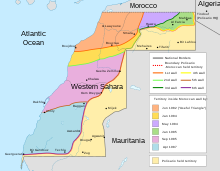
| WARNING: Smara is in the disputed territory of Western Sahara near the Berm that separates Moroccan-held territory from territory held by the Sahrawi Republic. The region extending for 30–50 kilometres (19–31 mi) west of the Berm is littered with land mines. See the warning on that article for more information. | |
| (Information last updated 06 Jan 2024) |
Smara is a town in Western Sahara.
Understand
edit
Smara was founded as an oasis for travellers in 1869. Later, in what was then Spanish Sahara, Smara become a garrison town. In 1975, Morocco took control of Saguia Elhamra province as Spain withdrew. The Moroccan army took the city from the Polisario Front in 1976. There is a 1991 cease-fire between the Polisario Front and Morocco, overseen by the United Nations' MINURSO forces. Not an active war, not a peace settlement.
The town is enclosed by a section of the Moroccan Walls, also known as the Berm, a fortification stretching an approximately 2,700 km from Morocco trough Western Sahara. Its position, which part of it is manned and guarded, where the minefields are located; this information is for obvious reasons not handed out. If you get to close to it you will be told to turn around. Walking off the road and into the landscape could cost you a leg or your life.
There is a strong Sahrawi presence in the town. There is an equally strong Moroccan military presence in the town. This situation creates some tension. Tourists are rare in Smara. You will therefore get some attention, but not pushy or aggressive, as in some parts of Morocco.
Get in
editCTM, Supratours and Satas companies have daily travels to Smara to Agadir. Supratours have daily travel to Smara from Laayoune.
Get around
editThe town is small and most places can be reached by foot. There are also small taxis running within the town. The bus station may have small mini-buses going to local destinations.
Smara is divided by its 1 military airport; you will most likely spend some time in its eastern part.
See
edit
- 1 Mosquée Cheikh Maelainin (Zawiy Maalainin) (in the center of the city). Remains of a stone fortress, which enclosed a mosque. This is what is left after Sahrawi rebellions against Spanish and French colonial rule.
Remains of Smara as Spanish garrison town can be seen in the domed military barracks, at the west end of Boulevard Hassan II.
Do
editVisit Zaouyya of Cheikh Malainine. This used to be a school, where the Quran and Arabic were taught. Families picnic inside the grounds. Get henna done and get a local design with their own pattern.
Buy
editMelhfa/melhef is a veil coverup for women that is great to protect from the sun.
Eat
editSome cafés along the town's main road, Boulevard Hassan II, serve omelettes, sandwiches and pizza. Across that street, in the market area, are a couple of places serving barbecued meat (camel, sheep) and fresh salad. Fresh bread, tinned sardines and bottled water may be a safer choice; these are available in small stores. Maro is a local rice and camel dish.
Drink
editBottled water or boil tap water and make tea. Water out of the tap is only for the brave.
Sleep
editThe town's main road is Boulevard Hassan II, and most hotels are on it. If one does not want to host you, for any reason, ask them for a recommendation: you'll be pointed at a decent place where you get a room for about USD15.
Connect
editGo next
editAsk the police/military at exit points for the road ahead. When they tell you not go to a some way, just don't do. Roads to Akhfenir and to Laayoune are easy to and probably the safest to follow. All other roads basically go straight through the desert - there are no road signs, and unless you really know how to follow GPS signals, you are putting your life at risk.

